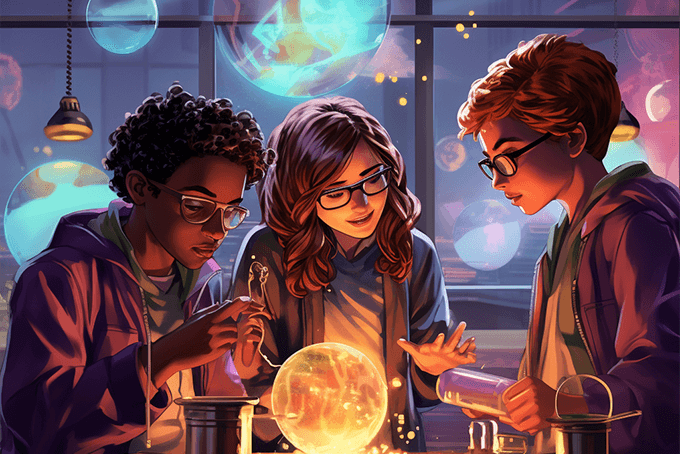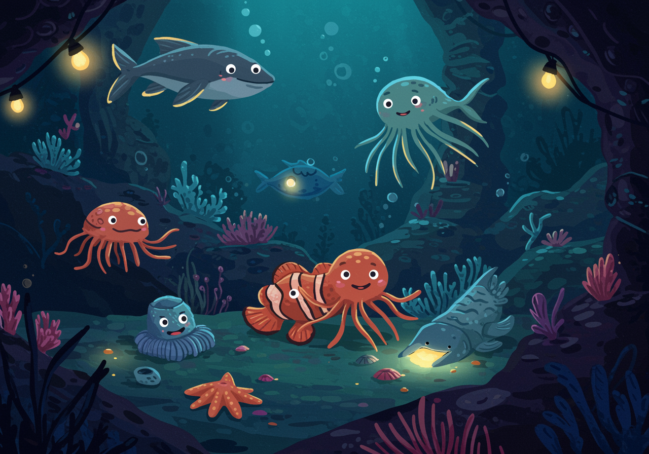Heading back to school can be an exciting time for toddlers as they embark on a new learning journey. Engaging in fun and educational activities can not only make the transition smoother but also foster their overall development. In this article, we will explore various back to school activities for toddlers, including understanding the importance of these activities, creative art projects, engaging story time sessions, outdoor activities to foster social skills, and educational games that make learning fun.
Understanding the Importance of Back to School Activities
Back to school activities play a crucial role in the development of toddlers. These activities provide them with a sense of structure and routine, which is essential for their overall growth. Engaging in different activities helps enhance their cognitive, physical, and social skills, making them better prepared for the challenges of school life.
Moreover, back to school activities serve as a platform for toddlers to explore their interests and discover new talents. By participating in a variety of activities, children can uncover hidden passions and develop a sense of identity and self-confidence. These experiences contribute to their personal growth and help shape their future aspirations and goals.
The Role of Activities in Child Development
Engaging in various activities allows toddlers to explore their creativity and imagination. It helps develop their fine motor skills, hand-eye coordination, and problem-solving abilities. Activities also promote cognitive development by encouraging critical thinking and decision-making. Additionally, they provide opportunities for toddlers to learn and practice important social skills, such as sharing, taking turns, and cooperating with others.
Furthermore, participating in activities fosters a sense of independence and autonomy in toddlers. As they engage in tasks and challenges, children learn to overcome obstacles, make choices, and take ownership of their actions. This sense of empowerment not only boosts their self-esteem but also instills valuable life skills that will benefit them in their academic and personal journeys.
How Activities Ease the Transition to School
Transitioning from home to a school environment can be overwhelming for toddlers. However, engaging in back-to-school activities can ease this transition by familiarizing them with the concept of learning, establishing a routine, and creating a positive association with the school. These activities help build confidence, reduce anxiety, and create a sense of excitement for their new educational journey.
Moreover, participating in back to school activities allows children to form connections with their peers and educators, paving the way for meaningful relationships and a supportive learning environment. By engaging in collaborative tasks and group activities, toddlers learn the value of teamwork, communication, and empathy, essential skills that contribute to their social and emotional development. These early interactions set a foundation for positive social behaviors and interpersonal connections that will benefit them throughout their school years and beyond.
Creative Art Projects for the First Day
Art projects are an excellent way to kickstart the first day of school for toddlers. They not only foster creativity but also allow children to express themselves. By providing simple and fun art supplies, such as non-toxic paints, crayons, and stickers, toddlers can explore their artistic abilities and create masterpieces.
Engaging in art activities on the first day of school can help toddlers feel more comfortable in their new environment and build a sense of community with their peers. It can also serve as a great icebreaker, allowing children to bond over their shared love for creativity and imagination.
Simple and Fun Art Supplies for Toddlers
When choosing art supplies for toddlers, it is important to select safe and age-appropriate materials. Non-toxic paints and crayons are great options as they are easy to handle and washable. Stickers, glitter, and colored paper can also add excitement to their artwork. Letting toddlers experiment with different textures and materials can enhance their sensory development and spark their creativity.
Exploring art supplies not only helps toddlers develop their fine motor skills but also encourages them to think outside the box and problem-solve creatively. It allows them to practice decision-making and express their emotions in a safe and supportive environment.
Ideas for Displaying Your Child’s Artwork
Displaying your child’s artwork not only encourages their artistic progress but also boosts their self-esteem. Creating a dedicated art display area in your home, such as a gallery wall or a refrigerator art display, allows toddlers to see their work being appreciated. Celebrating their creations can motivate them to continue exploring their artistic talents.
Rotating their artwork on display can also show toddlers that their efforts are valued and that creativity is a continuous process. It can be a source of pride for them to see their pieces showcased and admired by family members and visitors, fostering a sense of accomplishment and validation for their hard work.
Engaging Story Time Sessions
Story time sessions help toddlers develop language skills, broaden their vocabulary, and ignite a love for reading. By choosing age-appropriate books and making the storytelling experience interactive, parents and educators can make story time sessions not only educational but also engaging and enjoyable.
Story time sessions are not only beneficial for language development but also play a crucial role in fostering emotional connections and nurturing imagination in young children. The shared experience of reading together creates a bond between the storyteller and the child, promoting a sense of security and comfort that can positively impact their overall well-being.
Choosing Age-Appropriate Books
When selecting books for toddlers, it is essential to consider their developmental stage and interests. Board books with simple illustrations and repetitive phrases are ideal for younger toddlers, while storybooks with engaging narratives and colorful illustrations are suitable for older toddlers. Incorporating books that reflect their experiences and introduce new concepts can captivate their interest and stimulate their cognitive development.
Furthermore, choosing diverse books that showcase characters from various backgrounds and cultures can help toddlers develop empathy and a broader perspective of the world around them. Exposing children to different traditions and lifestyles through storytelling can foster a sense of inclusivity and appreciation for diversity from a young age.
Making Story Time Interactive
Engaging toddlers in the storytelling process can enhance their comprehension and language skills. Encourage active participation by asking open-ended questions, inviting them to predict what happens next or imitate the sounds of characters. Using props, puppets, or finger puppets can also add a touch of excitement to the storytelling experience, making it more interactive and memorable.
In addition to traditional storytelling techniques, incorporating technology such as interactive e-books or audiobooks can provide a multi-sensory experience for toddlers, catering to different learning styles and preferences. This blend of traditional and modern storytelling methods can cater to a diverse audience of young readers, keeping them engaged and enthusiastic about story time sessions.
Outdoor Activities to Foster Social Skills
Outdoor play not only allows toddlers to enjoy the fresh air and physical exercise but also provides them with opportunities to develop social skills, problem-solving abilities, and resilience. Engaging in safe and fun outdoor games can help foster these skills while creating lasting memories.
Furthermore, outdoor play offers a sensory-rich environment that stimulates a child’s senses and promotes cognitive development. The sights, sounds, and textures of nature provide endless opportunities for exploration and learning. From feeling the cool breeze on their skin to hearing the chirping of birds, outdoor play engages all the senses and enhances a child’s sensory processing skills.
The Benefits of Outdoor Play
Outdoor play promotes gross motor development and physical fitness in toddlers. It allows them to explore their environment, develop coordination, and build strength. Additionally, playing outdoors stimulates their imagination, encourages teamwork, and enhances their ability to follow rules and take turns.
Moreover, exposure to natural light during outdoor play helps regulate children’s sleep-wake cycles and boosts their vitamin D levels, contributing to overall health and well-being. The open spaces and diverse terrain found outdoors also provide opportunities for children to practice risk assessment and decision-making, fostering independence and self-confidence.
Safe and Fun Outdoor Games for Toddlers
When planning outdoor activities for toddlers, safety should be a top priority. Simple games like tag, hide-and-seek, and Simon says can keep them engaged and active. Sensory activities, such as water play or nature scavenger hunts, can also provide opportunities for exploration and learning. It is important to create a safe environment and supervise toddlers closely during outdoor play.
Additionally, incorporating loose parts play into outdoor activities can enhance creativity and problem-solving skills in toddlers. Items like sticks, rocks, and leaves can spark imaginative play and encourage children to invent their own games and scenarios. By allowing for open-ended play, toddlers can explore their interests and preferences while developing their creativity and resourcefulness.
Educational Games that Make Learning Fun
Learning through play is a highly effective approach to early childhood education. Incorporating educational games into a toddler’s routine not only reinforces important concepts but also fosters a love for learning. These games can be enjoyed both independently and with adult guidance.
Incorporating Learning into Play
Infusing educational elements into playtime activities can enhance cognitive development and spark curiosity in toddlers. Building blocks, puzzles, and shape sorters can help develop problem-solving skills and spatial awareness. Counting games, memory matching games, and alphabet puzzles introduce early math and literacy concepts in an enjoyable way.
Recommended Educational Games for Toddlers
When selecting educational games for toddlers, opt for those that are age-appropriate and align with their interests. There are numerous interactive games available as apps or physical toys that cover various subjects, from colors and shapes to numbers and letters. Look for games that involve hands-on activities, encourage exploration, and provide opportunities for interactive learning.
Engaging toddlers in fun back-to-school activities sets the foundation for their educational journey. By understanding the importance of these activities, nurturing their creativity through art projects, fostering a love for reading through interactive story time sessions, encouraging social skills through outdoor play, and making learning fun with educational games, parents and educators can ensure that toddlers start their school experience on a positive and enriching note.
You might be interested:



